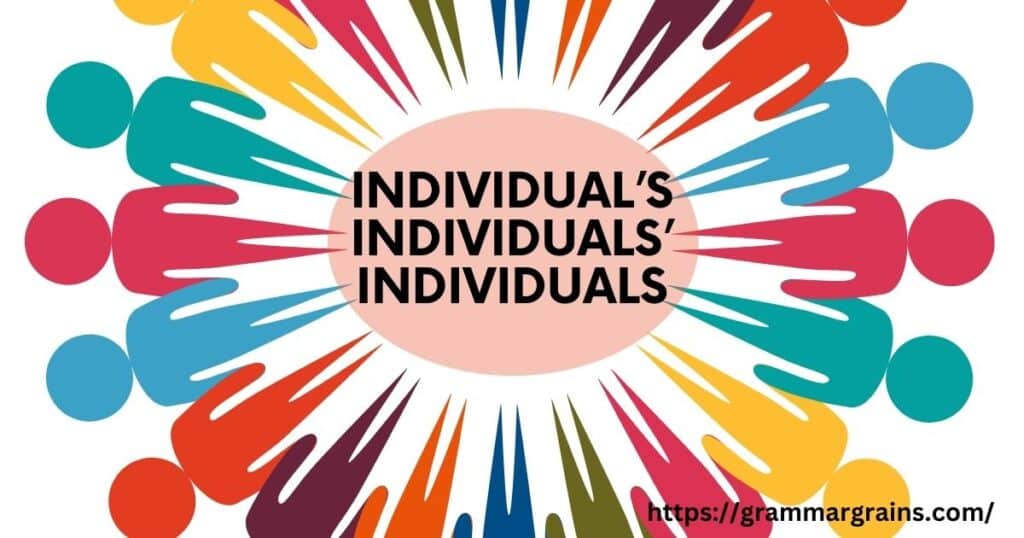Understanding the distinctions between “individual’s,” “individuals’,” and “individuals” is essential for mastering English grammar.
These terms, although similar in appearance, differ significantly in meaning and usage.
Grasping these differences can dramatically enhance clarity in writing and communication, especially in academic, professional, and personal contexts where precision matters most.
Why It Matters

When you think about the power of language, subtle grammatical differences often hold the key to effective communication.
Consider the importance of conveying ownership or distinguishing between singular and plural forms.
For instance, in professional writing, using “individual’s” instead of “individuals’” could drastically change the meaning of a sentence.
A simple apostrophe misplacement can shift the focus from a group to an individual, leading to potential misunderstandings.
Therefore, mastering these forms is not just about grammar but also about fostering clear, accurate, and meaningful exchanges.
The Role of Precision in Writing
Precision in writing is more than a stylistic preference; it is the foundation of effective communication.
Misusing possessive forms like “individual’s” and “individuals’” can lead to misinterpretations that undermine your intended message. For example, when you write, “the individual’s responsibilities,” you are specifically referring to tasks that belong to one person. However, when you state, “the individuals’ responsibilities,” it conveys shared duties among a group.
These nuanced differences highlight why precise grammar is critical in written communication.
In professional settings, precision impacts how readers perceive your credibility and attention to detail.
Imagine a business report where grammatical errors shift the meaning of key points.
A sentence like,
“The individual’s performance shaped the project’s success,”
clearly attributes the success to one person, while
“The individuals’ performances shaped the project’s success,”
emphasizes a collective effort.
Such clarity is essential in fields like law, academia, and business, where every word carries weight.
By mastering these distinctions, you enhance the readability and professionalism of your writing, making your message resonate more effectively.
Precision also plays a vital role in building trust with your audience.
When your grammar is correct, readers are more likely to focus on the content rather than potential errors.
In contrast, frequent mistakes may distract your audience, diluting the impact of your message.
For students, precise writing can improve academic outcomes by demonstrating a strong command of language, while for professionals.
It enhances their reputation as effective communicators.
Therefore, taking the time to understand the correct usage of “individual’s,” “individuals’,” and “individuals” is a worthwhile investment in your communication skills.
Context is King

Understanding Language Nuances
Context is the cornerstone of selecting the appropriate form—“individual’s,” “individuals’,” or “individuals.”
Each choice depends on the specific message you intend to convey.
For instance, consider the sentence:
“Each individual’s perspective adds value to the discussion.”
Here, “individual’s” emphasizes the unique contribution of every person involved.
In contrast, “The individuals’ perspectives shaped the outcome,” shifts the focus to collective input from multiple people.
Understanding the broader context ensures that your grammar choices align with your intentions. Let’s examine this further with real-life examples. In a meeting summary, using “the individual’s feedback” highlights one specific person’s input, while “the individuals’ feedback” acknowledges multiple contributions. In this way, the grammar you choose not only reflects the subject but also ensures clarity in how the information is received by your audience.
Context also extends to cultural and professional nuances.
In some industries, such as healthcare, legal writing, or customer service, the difference between singular and plural possessives can have significant implications.
Consider a healthcare scenario:
writing
“the individual’s test results were reviewed”
indicates one patient’s results, while
“the individuals’ test results were reviewed”
suggests that multiple patients’ results were evaluated. Misusing these forms could lead to miscommunication that impacts decision-making.
Understanding context allows you to avoid such errors and maintain the integrity of your writing.
Breaking Down the Basics

The Apostrophe
Your Trusty Sidekick in Possessive Forms
The apostrophe is a small punctuation mark with a significant role in clarifying possession.
Its placement can completely alter the meaning of a sentence.
For example, in the phrase,
“the individual’s idea,”
the apostrophe before the s indicates that the idea belongs to one person.
However, in
“the individuals’ ideas,”
the apostrophe after the s signifies that the ideas belong to multiple people.
To use apostrophes correctly, it is essential to understand their purpose and rules.
For singular nouns, always add ’s to show possession, as in “Sarah’s book” or “the manager’s office.”
For plural nouns ending in s, place the apostrophe after the s, as in “the students’ projects” or “the employees’ lounge.”
These rules are simple yet powerful tools for making your writing more precise.
Incorrect apostrophe usage is one of the most common grammar mistakes.
Writing “the individuals report” instead of “the individual’s report” leaves readers guessing whether the sentence refers to one person or many.
Similarly, placing the apostrophe incorrectly, as in “the individuals’s report,” creates unnecessary confusion.
By mastering apostrophe rules, you ensure that your writing is clear, professional, and easy to understand.
The Grammar Showdown

Singular, Plural, or Possessive?
Distinguishing between singular, plural, and possessive forms is essential for effective communication. Let’s break it down:
- “Individual’s” refers to one person’s ownership.
- For example: “The individual’s passport was issued yesterday.”
- “Individuals’” indicates ownership by a group.
- For instance: “The individuals’ contributions were invaluable to the project.”
- “Individuals” is the plural form without possession.
- Example: “Several individuals attended the seminar.”
Using these forms correctly ensures that your writing reflects the intended meaning without ambiguity.
Whether you are describing a single owner or a collective group, the distinction between these forms adds precision and professionalism to your communication.
A Quick Comparison Table for Clarity
| Form | Usage | Example |
|---|---|---|
| Individual’s | Singular possessive | The individual’s report was thorough. |
| Individuals’ | Plural possessive | The individuals’ reports were detailed. |
| Individuals | Plural (no possession) | The individuals presented their ideas. |
Understanding the Differences

The Lone Wolf: Individual’s (Singular Possessive)
The term “individual’s” is used to indicate that something belongs to one person.
This form adds clarity by pinpointing ownership or association with a single individual.
For instance, consider the sentence:
“The individual’s performance was exceptional.”
Here, the use of “individual’s” highlights that one person’s actions were being evaluated.
In academic or professional settings, such precision is essential to attribute credit or responsibility accurately.
This form is particularly useful when discussing unique contributions or personal belongings.
For example,
“The individual’s proposal was accepted by the committee”
suggests that a single person submitted the proposal.
Similarly, phrases like
“the individual’s feedback”
or
“the individual’s opinion”
help focus the narrative on one person’s perspective.
This specificity ensures that the audience understands who or what is being referred to, eliminating potential confusion.
Understanding the singular possessive form also provides insights into how ownership is structured in language.
For example, the phrase
“the individual’s belongings”
directly attributes the items to one person.
Without the apostrophe, the sentence could read ambiguously, causing misunderstandings.
This distinction becomes even more critical in legal, academic, or business contexts where precise attribution is required to avoid miscommunication or disputes.
The Wolf Pack: Individuals’ (Plural Possessive)
When referring to ownership involving multiple people, “individuals’” is the appropriate form.
It signifies collective ownership while maintaining a focus on the group as a whole.
For instance, “The individuals’ responses were insightful” emphasizes contributions from multiple people.
The apostrophe placed after the s indicates that the responses belong to several individuals.
This plural possessive form is particularly relevant in scenarios involving teamwork or group dynamics.
For example, in a workplace setting, you might write,
“The individuals’ achievements were recognized during the awards ceremony.”
This wording acknowledges that the accomplishments belong to a group rather than a single person.
Similarly, in educational contexts,
“The individuals’ projects were displayed at the science fair”
effectively communicates that multiple participants presented their work.
The use of “individuals’” often arises in discussions about collective ownership or shared resources.
Consider the phrase:
“The individuals’ rights must be respected.”
This usage underscores the importance of addressing collective needs while still maintaining the individuality of each person.
By mastering this form, writers can convey messages that are inclusive and precise, ensuring their content resonates with a diverse audience.
Just Plain Wolves: Individuals (Simple Plural)
The term “individuals” serves as the plural form of “individual” and is used when referring to more than one person without indicating ownership.
For example,
“Several individuals participated in the workshop”
simply states that multiple people were involved, without any mention of possession.
This form is often used to describe collective groups or general populations.
Understanding when to use “individuals” versus its possessive forms is essential for maintaining grammatical accuracy.
For instance,
“The individuals attended the seminar”
clearly indicates a group’s presence.
However, writing
“The individuals’ seminar”
would suggest that the seminar was organized or owned by the group, altering the meaning entirely.
These distinctions, though subtle, have a significant impact on the clarity of communication.
The plural form also allows for inclusive discussions about shared experiences or collective actions.
For example, in sociological studies, statements like
“The individuals in the community expressed varied opinions”
capture the diversity within a group.
This usage highlights the importance of recognizing multiple perspectives, making “individuals” a versatile term in both academic and conversational writing.
Common Mistakes and How to Avoid Them

One of the most common errors writers make is misplacing the apostrophe in possessive forms, leading to confusion.
For example, writing “the individuals idea” instead of “the individual’s idea” fails to show ownership and leaves the sentence unclear.
Similarly, using “the individuals’ idea” when referring to a single person introduces an error in number agreement.
To avoid such mistakes, it’s crucial to determine whether the subject is singular or plural and whether possession is involved.
Proofreading is an effective strategy for catching these errors.
Reading sentences aloud can also help identify inconsistencies in grammar and meaning.
For instance, when you read
“the individuals responsibilities”
out loud, the absence of an apostrophe becomes more apparent, prompting a correction to
“the individuals’ responsibilities.”
Another common pitfall is overcomplicating sentences by mixing possessive forms incorrectly.
For example, writing “the individual’s feedbacks were considered” is grammatically incorrect, as “feedback” is typically uncountable.
Instead, you should write
“the individual’s feedback was considered”
to maintain grammatical integrity.
Awareness of such nuances improves the overall quality of your writing.
The Path to Clear Communication
Mastering the distinctions between “individual’s,” “individuals’,” and “individuals” empowers writers to communicate more effectively.
Consider a team leader drafting a feedback summary. Writing “The individuals’ suggestions were implemented” acknowledges the group’s collective input, fostering a sense of collaboration. On the other hand, “The individual’s suggestion was implemented” focuses on one person’s unique contribution, demonstrating attention to individual input.
Precision in grammar enhances the readability of your content and ensures that your message resonates with your audience.
For professionals, using the correct form builds credibility and shows meticulous attention to detail.
For students, it demonstrates a strong command of language, which is essential for academic success.
Whether you’re writing an email, a report, or a blog post, understanding these grammatical nuances is a valuable skill.
Ultimately, language is a tool for connection.
By mastering these distinctions, you improve not only your writing but also your ability to convey ideas clearly and confidently.
With practice, the use of “individual’s,” “individuals’,” and “individuals” will become second nature, enabling you to craft messages that leave a lasting impression.
Conclusion
Understanding the distinctions between “individual’s,” “individuals’,” and “individuals” is more than a grammar lesson; it is a skill that enhances communication across various contexts. Mastering these forms allows you to convey messages with precision, whether highlighting individual achievements or addressing group contributions.
By practicing their proper usage, you ensure clarity, eliminate ambiguity, and elevate your writing. Remember, language is a tool for connection, and using it effectively strengthens both personal and professional relationships.
FAQs
What does “individual’s” mean?
It shows possession by one person, such as in “the individual’s opinion.”
When should I use “individuals’”?
Use it to indicate possession by multiple people, as in “the individuals’ contributions.”
Can “individuals” ever show possession?
No, “individuals” is a plural form and does not imply ownership.
How can I avoid mistakes with these terms?
Focus on context, proofread carefully, and ensure apostrophes are correctly placed.

Taila Lucy, an expert content writer at Grammar Grains, brings 4 years of experience crafting engaging pieces on grammar. Her work delves into synonyms, antonyms, slang, puns, and poetry, helping readers master English with creativity and flair.






